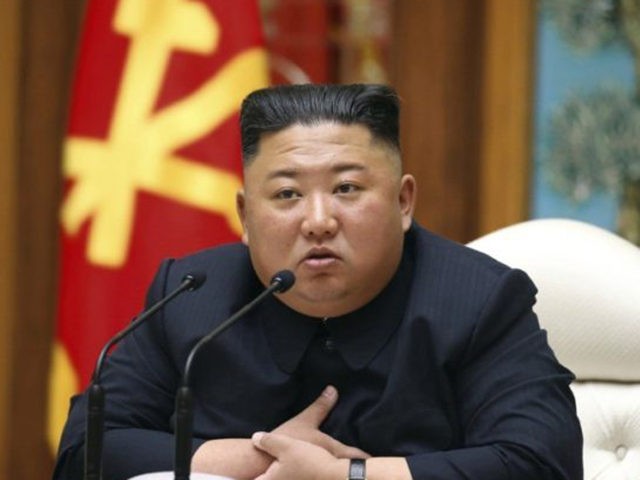North Korean dictator Kim Jong-un, presiding over the ruling Korean Workers’ Party (WPK) Congress on Friday, reportedly proposed “comprehensively expanding and developing the external relations of the country,” according to state media.
The current Party Congress is the eighth in the history of North Korea, founded in 1948 by communist dictator and Kim Jong-un’s grandfather Kim Il-sung, and the first in five years. Kim opened the event with a speech this week in which, while praising his underlings, he admitted that nearly every objective in the Party’s “five-year plan” drafted at the last congress had failed.
International observers are reading North Korean state media — the only legal media in the country and only confirmed information about the event attainable — eagerly seeking clues as to how Kim Jong-un will lead his regime’s foreign policy following the inauguration of President-elect Joe Biden. The state newspaper Rodong Sinmun did not give any indication that Kim or any other party member mentioned the transition in the United States specifically — or the United States at all.
The text instead merely mentioned foreign policy as one of the many issues the only legally existing political party in North Korea discussed.
Kim Jong-un’s report Friday on the progress and future of the party, Rodong Sinmun relayed, did discuss relations with South Korea.
“The report studied the issue of affairs with south [sic] Korea as required by the prevailing situation and the changed times and declared the general orientation and the policy stand of our Party for comprehensively expanding and developing the external relations,” the propaganda newspaper reported.
Expanding ties with South Korea is a surprising proposal from the Congress given how embittered relations between the two countries became in 2020. While Kim has met with leftist South Korean President Moon Jae-in on several occasions, including allowing him to visit North Korea’s Mount Paektu volcano, North Korean foreign policy has become increasingly abrasive with Seoul. In June, North Korean officials bombed a joint liaison office set up by Moon and Kim two years prior, allegedly over South Koreans using balloons to send humanitarian aid and information about the outside world into North Korea.
Kim Yo-jong, a senior regime figure and Kim Jong-un’s sister, issued a scathing, insult-laden tirade against Moon that month.
“Whenever [Moon] makes public appearances, he lets out childish and hope-filled dreamy rhetoric and tries to look big, just and principled just like an apostle of peace,” Kim Yo-jong wrote in a statement signed by her. “It was so regretful for me to see his disgusting behavior alone. So I decided to prepare a bomb of words to let it be known to our people.”
Yonhap, a South Korean news agency, noted that in remarks about the military on Thursday, Kim had not mentioned nuclear weapons or language that typically alluded to them, like “war deterrent.” He did note that the Party would strive to improve the North Korean military’s ability to fight, but in unspecific terms that appeared less belligerent than in the past — and far more conciliatory than the statements from Kim Yo-jong last year. One South Korean experts speaking to Yonhap described Kim’s military statement as “quite a mild message” compared to past remarks that “leaves room for negotiations.”
North Korea has for decades worked on developing nuclear weapons illegally. The country’s last nuclear weapons test occurred on September 2017, triggering severe sanctions on Pyongyang’s economy supported at the United Nations even by China, North Korea’s closest ally. Since then, Kim has not issued any statements suggesting he would shut down the program, but ongoing monitoring has not indicated any imminent nuclear tests or other significant nuclear weapons development activity.
Kim’s tone regarding South Korea, observers told Reuters, appeared more subdued. The term “South Korea affairs” as a separate topic from the relationship between North and South Korea was unprecedented under Kim Jong-un. North Korea does not consider the Koreas two countries, but rather one Korea featuring a rogue province in its southern half.
Outside of the optimistic, if vague, call for expanding foreign ties, the report issued Friday again reiterated that North Korea had largely failed to achieve any progress in the past five years, repeatedly referencing “shortcomings” and the need to learn “lessons” from the past.
“[Kim’s report] also set forth directions and ways for opening up a fresh golden age by carrying out a great revolution in every field of socialist culture including education, public health, literature and arts, making those shortcomings and lessons a stepping-stone for progress and leaps forward,” Rodong Sinmun attested.
The Party urged “ideological education above all” — meaning the indoctrination of the populace into communism and the worship of the Kim family, or a religion known as juche — and the promotion of the “revolutionary lifestyle.”
Kim’s language about the “shortcomings” on Friday was less severe than his remarks during the opening of the Party Congress on Wednesday.
“Though the period of implementing the Five-Year Strategy for the National Economic Development ended last year, almost all sectors fell a long way short of the set objectives,” Kim said then. He nonetheless bizarrely congratulated his communist regime for “remarkably” raising the “prestige” of North Korea.
“In this period the unprecedented, worst-ever trials put great obstacles on the road of advance of our revolution, but our Party achieved great successes through tenacious and accurate practical activities aimed at implementing its fighting programmes,” Kim claimed in the same speech in which he admitted to failing at nearly every goal attempted.
Friday is believed to be Kim Jong-un’s 37th birthday, a fact that state media did not highlight.

COMMENTS
Please let us know if you're having issues with commenting.